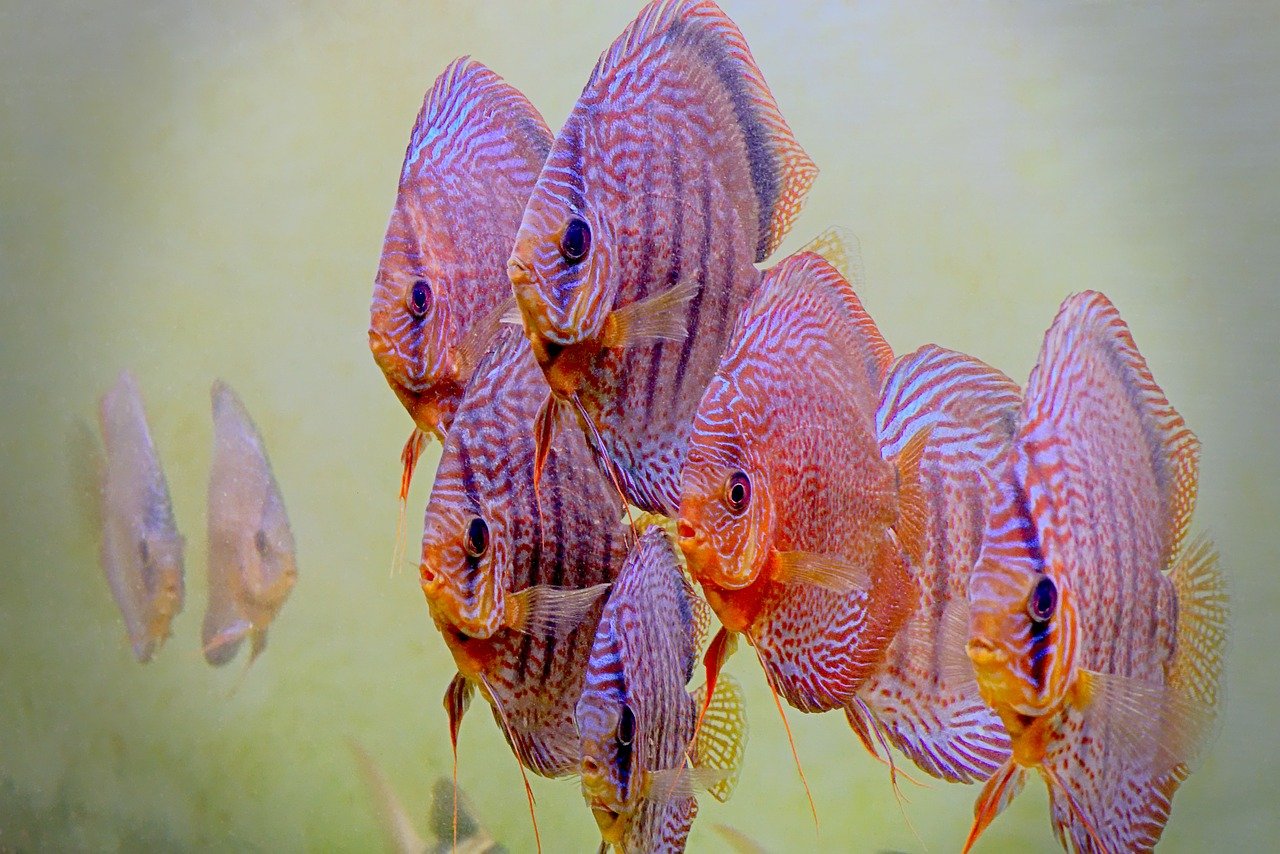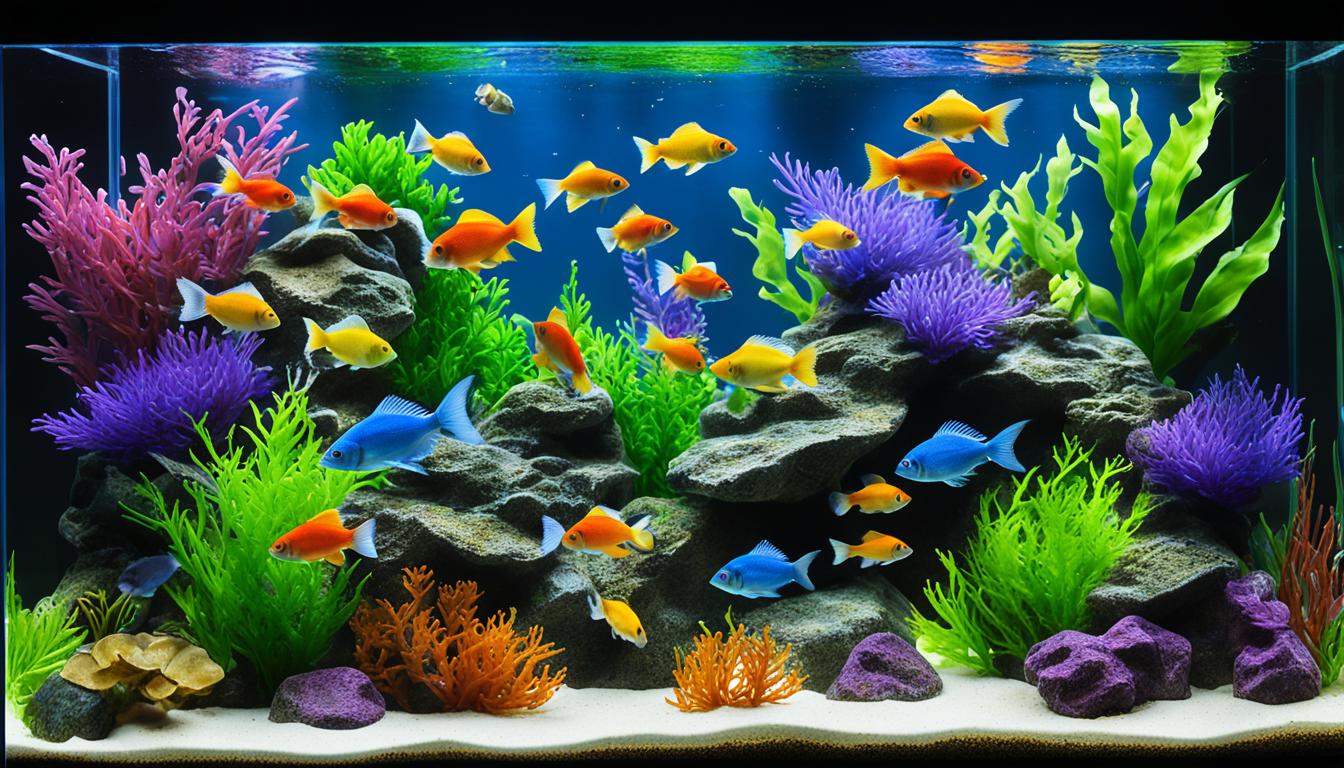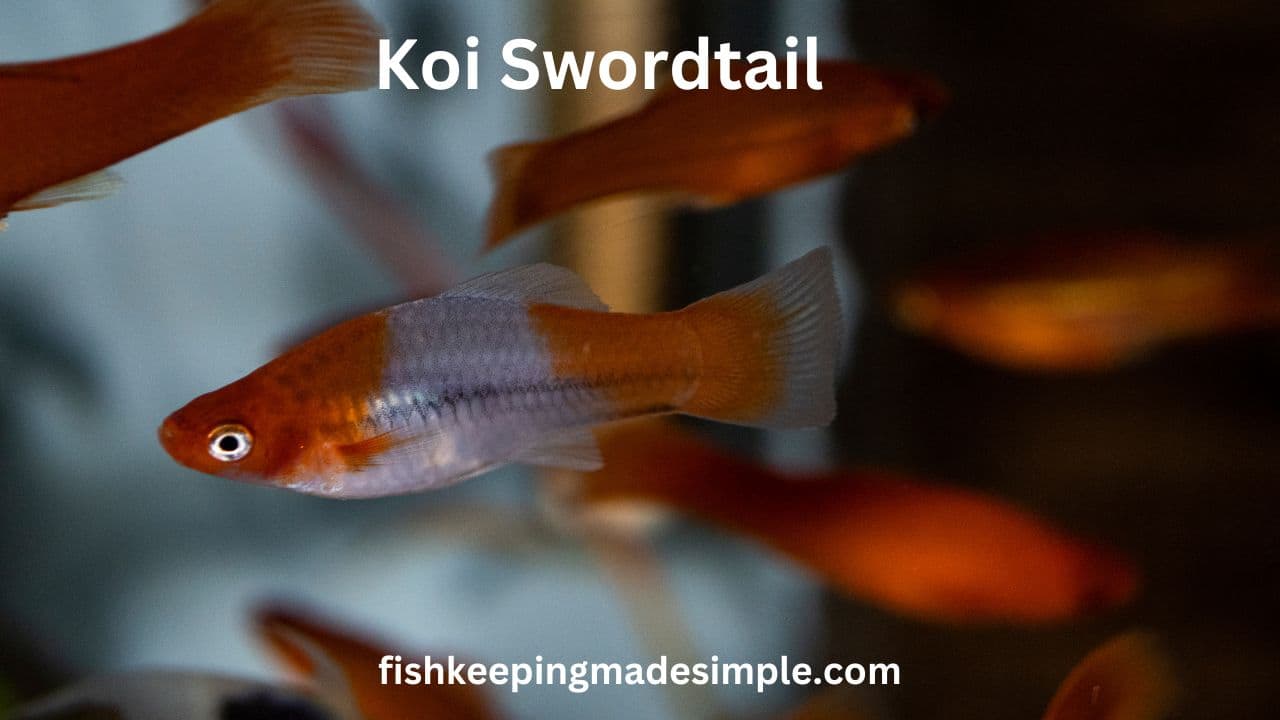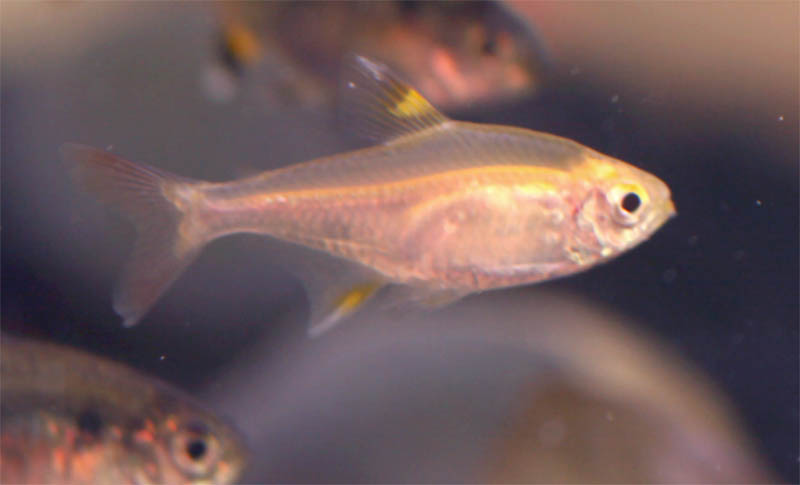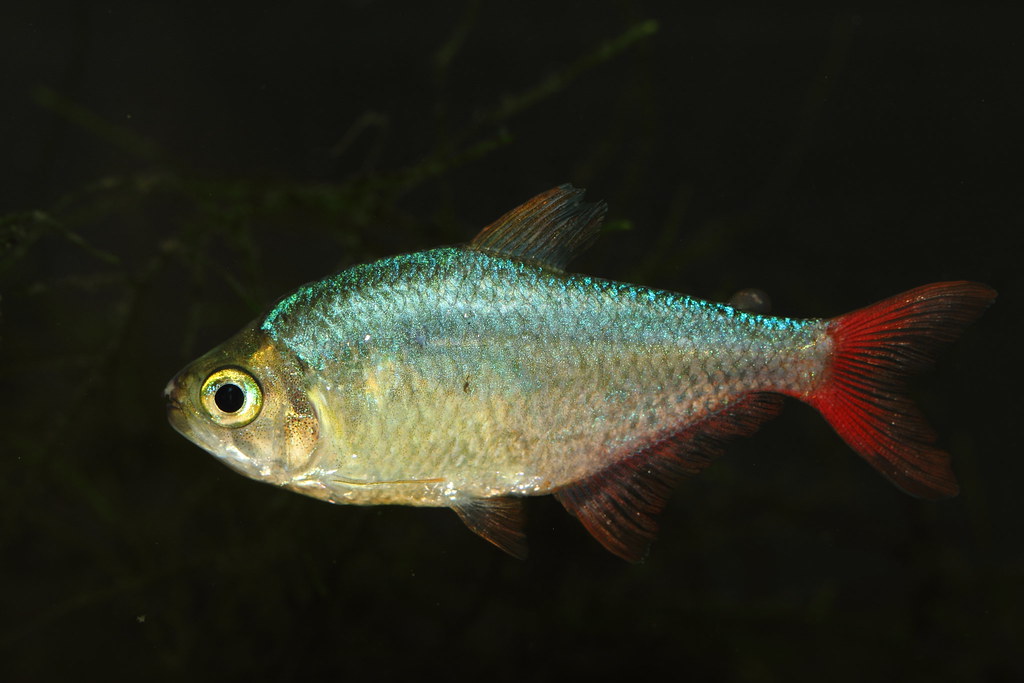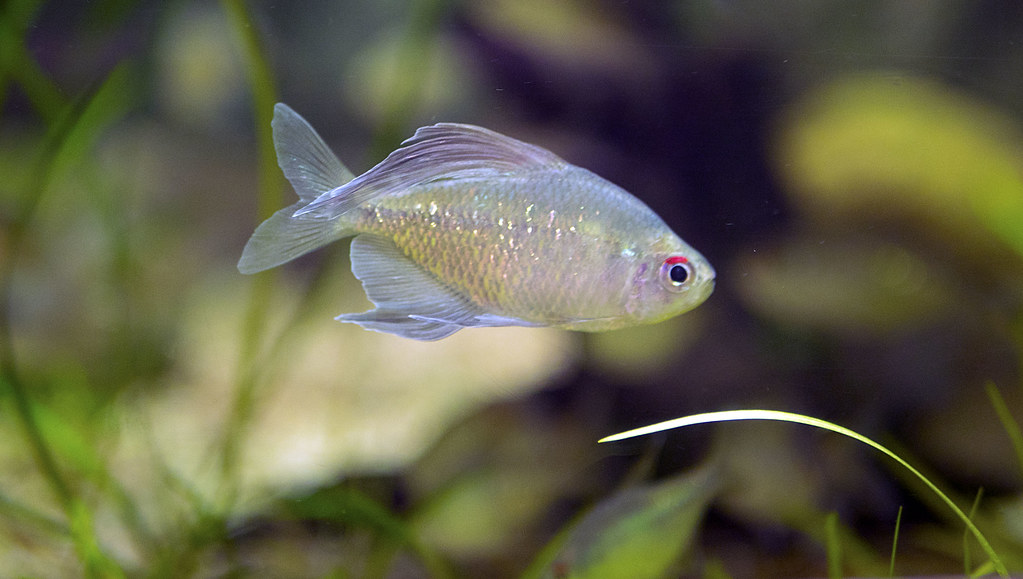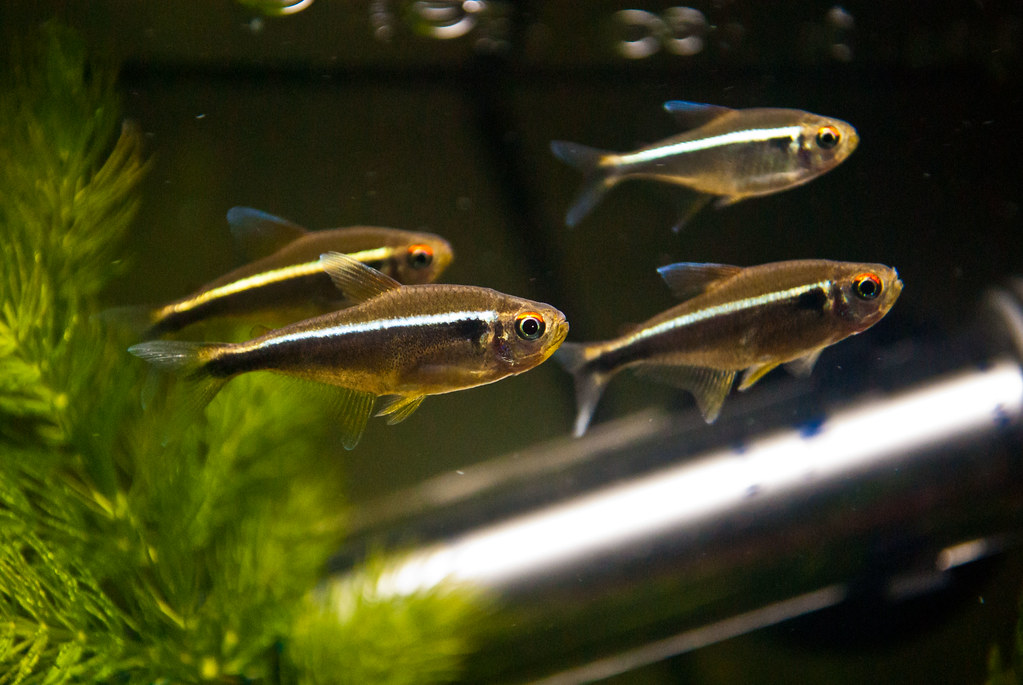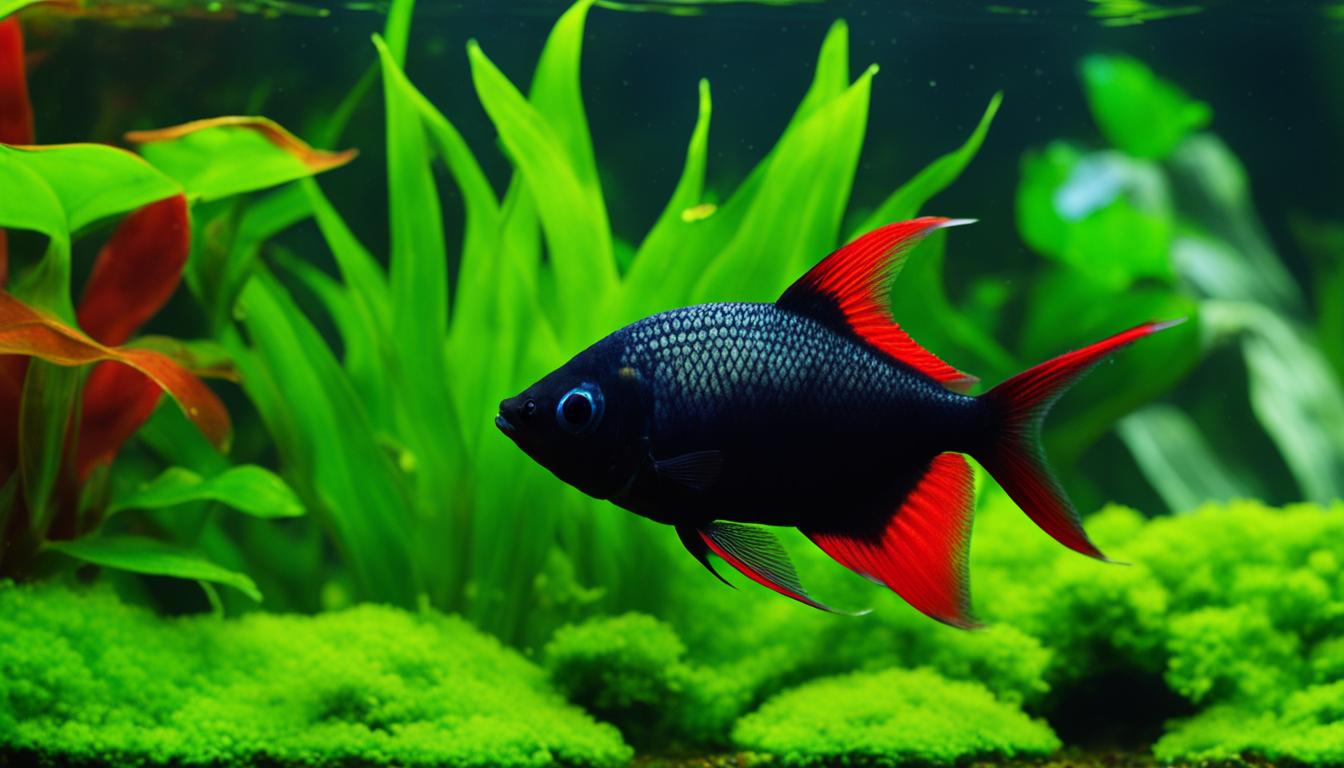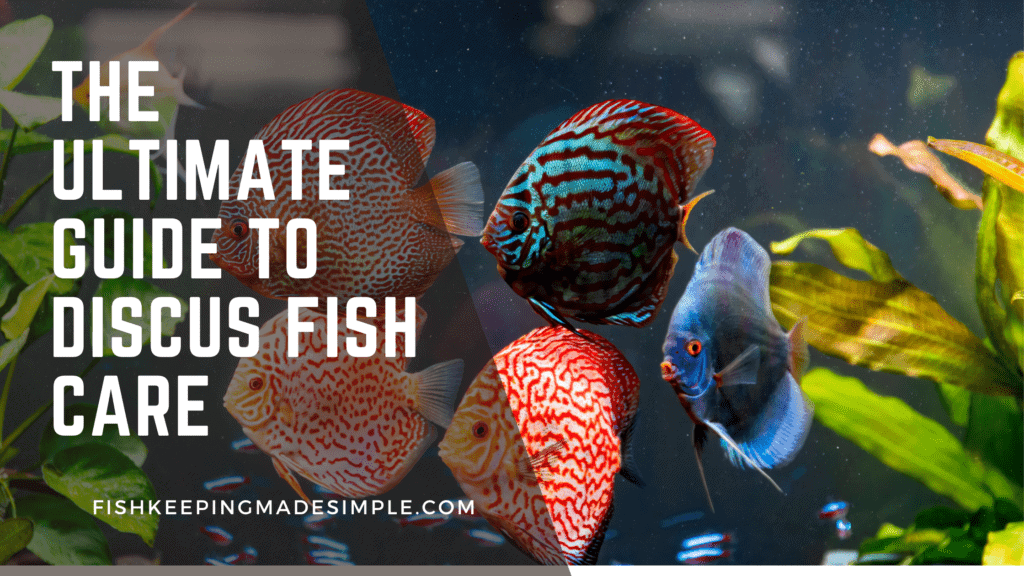
Welcome to my comprehensive guide on discus fish care! As a fish owner myself, I understand the importance of providing the best care possible for our aquatic pets. Discus fish are no exception – they require specific conditions and care to thrive and maintain their health. In this guide, I will share with you all the essentials you need to know to create the perfect environment for your discus fish to flourish. From setting up their tank to maintaining their health, I’ve got you covered. Let’s dive in!
Discus Fish Overview
- Scientific name: Symphysodon
- Common name: Discus fish
- Origin: Amazon Basin in South America
- Size: Discus fish can grow up to 6-8 inches in diameter
- Life expectancy: Discus fish can live up to 10-15 years with proper care.
- Different Colors: Discus fish come in various colors such as brown, green, red, blue, and turquoise.
- Diet: Discus fish are omnivores and require a balanced diet of frozen or live foods such as bloodworms, brine shrimp, and small cubes of meat.
- Temperament: Discus fish are peaceful and social, but they can be shy. They do best in groups of three or more.
- Tank size: A 55-gallon tank is a minimum size for a single discus fish, with a larger tank needed for groups.
- Temperature: Discus fish prefer a temperature range of 82°F to 86°F.
- pH: Discus fish prefer a pH of 6.0 to 7.0.
- Hardness level (TDS): Discus fish prefer a TDS level of 50 to 100.
- Care level: Discus fish are considered intermediate-level pets and require a bit more care than other fish.
- Breeding style: Discus fish lay eggs and care for their young, making them excellent parents.
- Compatible fish: Discus fish do best with other peaceful fish such as angelfish and tetras.
- Type of Tank most suitable for Discus fish: Discus fish prefer a well-planted tank with plenty of open space for swimming and hiding places. A planted discus tank with a soft substrate and plenty of hiding places is ideal.
Key Takeaways
- Discus fish have specific requirements that set them apart from other freshwater fish species
- Creating the ideal environment for your discus fish is crucial for their overall well-being
- Maintaining optimal water quality and temperature is crucial for the health and vitality of discus fish
- Proper nutrition is paramount for the well-being of your discus fish
- Monitoring the behavior and health of your discus fish is essential for early detection of potential issues
Understanding the Unique Needs of Discus Fish Care
Welcome back to the essential guide to Discus Fish care. In this section, I will guide you through the unique needs of Discus Fish so you can provide them with the best possible care.
Water Parameters
Discus Fish require specific water parameters to thrive. These fish are sensitive to water conditions, and even slight changes can stress them out. You must maintain consistent water conditions by performing regular water tests and making necessary adjustments.
| Water Parameter | Ideal Range |
| Temperature | 82-86°F |
| pH Level | 6.0-6.5 |
| Hardness | 1-3 dGH |
Make sure to invest in a reliable thermometer and pH test kit to monitor these levels regularly.
Tank Size
Discus Fish require a spacious tank to swim around comfortably. As a rule of thumb, you should have at least 10 gallons of water per Discus Fish. Considering Discus Fish grow to be around 8-10 inches in length, a tank size of 50-75 gallons will provide ample swimming space for a group of Discus Fish.
Temperature Requirements
Discus Fish are tropical fish and require warm water to thrive. The ideal temperature range for Discus Fish is between 82-86°F. Invest in a reliable heater to maintain a consistent temperature in your tank.
By understanding these unique requirements, you can provide the best possible care for your Discus Fish. In the next section, I’ll guide you through the process of setting up the perfect Discus Fish tank.
Setting Up the Perfect Discus Fish Tank
Creating a comfortable and healthy environment for your discus fish is vital for their well-being. In this section, I will guide you through the essential steps of setting up the perfect discus fish tank.
Step 1: Choosing the Right Tank
The first step in setting up a discus fish tank is selecting the right size. Discus fish require a spacious tank to thrive, and the general rule is to have at least 10 gallons of water per fish. A 55-gallon tank is the ideal choice, allowing room for multiple fish and easy maintenance. Make sure the tank has a lid to prevent any jumping, and choose a location with minimal sunlight exposure and temperature fluctuations.
Step 2: Selecting the Right Substrate
Discus fish prefer a soft and fine-grained substrate. Avoid using rough gravel or sand that may injure their delicate fins. A good option is to use aquarium sand or special discus fish substrate to create a natural-looking environment. Ensure the substrate is shallow, no more than 2 inches deep as discus fish like to sift through it to find food.
Step 3: Installing the Right Equipment
Equipping your tank with the proper equipment is crucial in maintaining a healthy and stress-free environment for discus fish. You will need a sturdy filter to keep the water clean and aerated, a heater to maintain a consistent temperature of 82-86°F, and a thermometer to monitor the water temperature. A high-quality water testing kit is also essential to ensure the water parameters meet discus fish requirements.
Step 4: Establishing the Ideal Water Conditions
Discus fish require specific water conditions to thrive. The pH level should be between 6.0-7.5, with a hardness of 1-8 dGH. Ideally, the aquarium water should be dechlorinated, to remove any harmful chemicals that can be present in tap water. Use reverse osmosis or distilled water for water changes to avoid introducing unwanted chemicals into the tank.
Step 5: Adding Decorations and Plants
Decorations and live plants are essential to create a natural-looking environment for discus fish. Choose decorations that mimic their natural habitat such as driftwood and smooth rocks. Avoid sharp and rough objects that may harm their fins. Live plants such as Amazon sword plants and Java fern not only provide oxygen and filtration but also create a peaceful and calming environment for your discus fish.
| Discus Fish Tank Setup Checklist: |
| • Tank size of at least 55 gallons |
| • Soft and fine-grained substrate |
| • Filter, heater, thermometer, and water testing kit |
| • Ideal water conditions: pH 6.0-7.5, hardness 1-8 dGH, and dechlorinated water |
| • Decorations and live plants |
By following these guidelines for creating a discus fish tank, you will provide your fish with a healthy and stimulating environment that will help them thrive. In the next section, I’ll cover all the essential steps for maintaining ideal water quality and temperature.
Maintaining Water Quality and Temperature
As mentioned earlier, maintaining optimal water quality and temperature is vital for the health and vitality of your discus fish. Here are some essential discus fish care instructions on how to ensure the water conditions in your tank remain stable.
Checking Water Parameters
Regularly monitoring the water parameters of your tank is crucial for maintaining a healthy environment for your discus fish. Use a reliable water testing kit to check the levels of ammonia, nitrites, nitrates, pH, and temperature.
The optimal water parameters for discus fish care are:
| Parameter | Ideal Level |
| Ammonia | 0 ppm |
| Nitrite | 0 ppm |
| Nitrate | less than 20 ppm |
| pH | 6.0-7.5 |
| Temperature | 82-86° F |
If you notice any irregularities in the water parameters, take appropriate steps to correct them immediately. Maintaining stable water conditions is crucial for the health of your discus fish.
Performing Water Changes
Regular water changes are essential for discus fish care. Aim for a 25-30% water change every week to keep the water quality in your tank optimal. During water changes, siphon waste and debris from the substrate to prevent the accumulation of harmful bacteria and toxins.
Cleaning the Filter
Regularly cleaning the filter is crucial for maintaining optimal water quality in your tank. Aim to clean the filter media once a month to prevent the accumulation of waste and debris.
Adjusting Water Temperature
Discus fish require warm water temperatures for optimal health. Use a reliable aquarium heater to maintain water temperatures between 82-86° F. Avoid sudden temperature fluctuations, as this can cause stress and illness in your fish.
By implementing these discus fish care essentials, you can maintain a clean and stable environment for your discus fish, promoting their health and well-being.
Feeding Discus Fish for Optimal Health
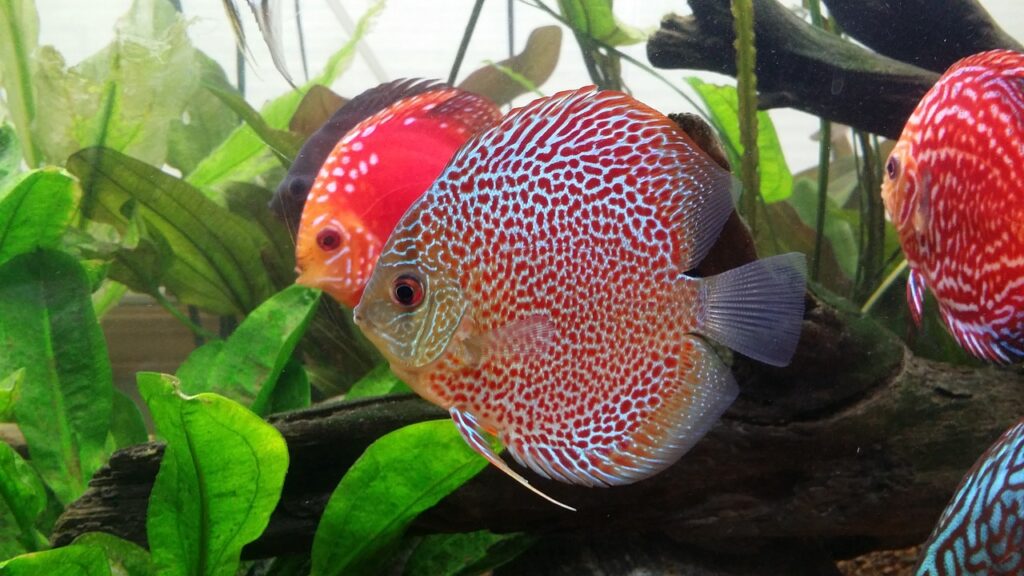
When it comes to caring for your discus fish, providing them with proper nutrition is paramount. Feeding your fish a balanced diet is essential for their growth, vibrancy, and overall health. In this section, I’ll cover everything you need to know about feeding your discus fish.
Discus Fish Feeding Schedule
Discus fish should be fed small meals multiple times a day to ensure they receive adequate nutrition without overfeeding. As a general rule, aim to feed your fish 3-5 times a day, with each meal being no larger than what the fish can finish in 2-3 minutes.
Discus Fish Dietary Needs
Discus fish are omnivores, which means they eat both meat and vegetables. A well-balanced diet for discus fish should consist of high-quality protein, such as brine shrimp, bloodworms, and beef heart, as well as vegetable matter, such as spirulina and algae wafers.
Feeding Techniques
When feeding your discus fish, it’s essential to avoid overfeeding, as this can lead to health issues such as bloating and constipation. It’s also important to ensure that the food is suitable for the size of the fish’s mouth. Small pellet or flake food is ideal for young discus fish, while larger pellets or frozen food are better suited for adult fish.
Preventing Overfeeding
Overfeeding is one of the most common mistakes made by discus fish owners. To prevent overfeeding, measure out the amount of food your fish requires for each meal and avoid adding more food until the previous meal has been fully consumed. Additionally, avoid feeding your fish scraps or human food, as this can lead to digestive issues.
Tip: If you’re unsure how much food to feed your discus fish, start with a small amount and adjust accordingly based on their appetite and growth rate.
Feeding your discus fish a well-balanced diet is essential for their overall health and vitality. Follow these feeding guidelines to keep your fish thriving!
Maintaining a Clean Discus Fish Tank
Keeping your discus fish tank clean is crucial for the overall health and well-being of your vibrant pets. Regular maintenance and cleaning will prevent the buildup of harmful toxins and ensure a safe environment for your fish to thrive.
Water Changes
One of the most critical aspects of tank maintenance is ensuring proper water quality. Regular water changes are essential to remove excess waste and debris, preventing the accumulation of harmful substances and bacteria. As a general rule, aim to change 10-20% of the water in your discus fish tank every week.
When performing water changes, it’s essential to use a water conditioner to neutralize any chlorine or chloramine in your tap water. Additionally, make sure the new water you add to the tank matches the same temperature and pH as the existing water to prevent shock to your fish.
Filter Maintenance
Your tank’s filtration system is responsible for removing impurities and maintaining optimal water quality. Regularly cleaning and maintaining your filter is crucial for ensuring it functions correctly and effectively removes harmful substances from the water.
When cleaning your filter, make sure to follow the manufacturer’s instructions carefully. Generally, it’s recommended to rinse mechanical filter media with tank water every month and replace it every 6-12 months, depending on usage. Biological filter media should not be replaced unless it is physically damaged or exhausted.
Substrate Upkeep
The substrate, or the material at the bottom of your tank, can harbor harmful bacteria and waste, making regular maintenance crucial. If you have a planted tank, vacuuming the substrate is essential to prevent the accumulation of organic debris that can lead to algae growth.
When vacuuming, make sure not to disturb the substrate too much, as this can release harmful toxins into the water. Aim to vacuum around 10-20% of the substrate every week, depending on your tank’s bioload.
Pro tip:
While cleaning your tank, observe your discus fish for any signs of stress or illness. If you notice any abnormal behavior or physical symptoms, address the issue promptly to prevent further complications.
Regularly maintaining your discus fish tank is essential for ensuring the long-term health and well-being of your vibrant pets. By following these simple tips, you can create a clean and safe environment that allows your discus fish to thrive.
Creating the Right Social Environment for Discus Fish
Discus fish are known for their social nature, and creating the right social environment is essential for their mental well-being. As a discus fish owner, you have to take some necessary steps to make sure your fish live in a harmonious environment.
The first thing to consider is the tank size. Discus fish require a larger tank than most freshwater fish, and overcrowding the tank can lead to aggression and stress. Ensure that each fish has enough space to move around without being constantly chased or threatened by others.
Another critical factor to consider is selecting suitable tank mates. Not all fish species are compatible with discus fish, and choosing the wrong companions can lead to conflicts and harm. Ideally, you can select other peaceful species that have similar water requirements and temperaments.
Understanding the hierarchy of discus fish is also important. Discus fish are known to establish a pecking order, with dominant fish at the top of the hierarchy and submissive fish at the bottom. As such, it’s crucial to avoid adding too many fish at the same time, as this can upset the established hierarchy and cause stress and fights.
Finally, providing hiding spots and appropriate tank decor can help reduce stress and maintain peace in the tank. Discus fish love to have hiding places to retreat to when feeling threatened or stressed. You can add rocks, plants, and other decorations to create natural-looking hiding spots that will make your fish feel secure.
Common Discus Fish Tank Mates
| Fish Species | Comments |
| Cardinal tetras | Peaceful and colorful, great in larger schools |
| Corydoras catfish | Bottom-dwellers, helps to clean up food scraps and other debris. |
| Bristlenose plecos | Herbivores that help keep the tank clean, don’t produce much waste |
| Otocinclus catfish | Algae-eaters, good for keeping the tank clean |
| German Blue Rams | Small and peaceful, great colors and patterns |
Discus Fish Breeding
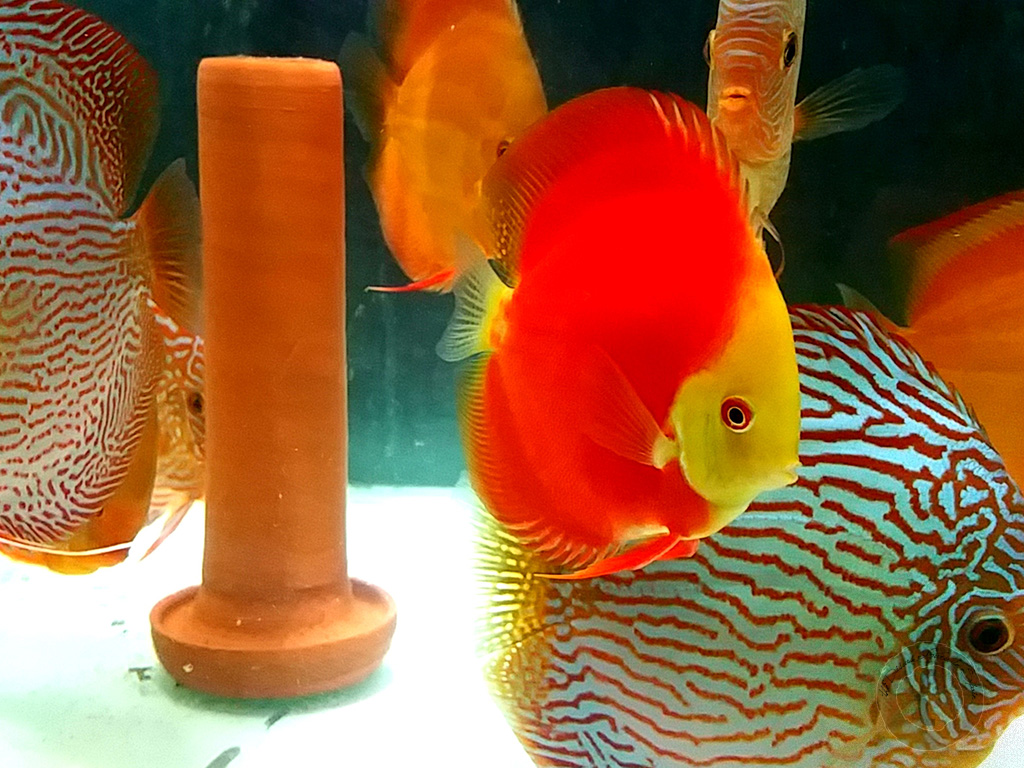
Breeding discus fish is a fascinating and rewarding activity for any fishkeeper. However, it requires careful planning and attention to detail. In this section, I’ll guide you through the key steps and considerations for successfully breeding discus fish. By the end of this section, you’ll be equipped with the knowledge to embark on this exciting journey.
Preparing for Discus Breeding
Setting up the Aquarium
Before you can start breeding discus fish, you need to set up a suitable environment for them. You should have a large aquarium with a capacity of at least 30 gallons and a good filtration system. Additionally, you should provide adequate lighting, heating, and water flow in the aquarium. Make sure the water flow is not too much otherwise it disturb the pair and they may not interested in spawning.
Choosing the Right Discus Pair
The first step in breeding discus fish is selecting a suitable breeding pair. When choosing breeding pairs, it’s essential to select healthy and mature fish. Look for signs of good health, such as bright colors, active swimming, and full fins. Additionally, consider the compatibility of the pair. Discus fish are known for their territorial nature, so choose pairs that get along well and exhibit similar traits and characteristics.
Conditioning the Discus Fish
Before breeding, you should condition the discus fish by feeding them a variety of high-quality foods and maintaining optimal water conditions. This will help to ensure that the fish are in optimal health and ready for breeding.
The Breeding Process
Triggering Spawning
To trigger spawning, you need to create the right conditions for the discus fish. This includes changing the water temperature (82 and 86 degrees Fahrenheit), pH (6.0 to 6.5), and hardness to mimic the conditions of their natural habitat. You can also add a spawning cone or flat stone to the aquarium to provide a place for the fish to lay their eggs.
Caring for the Eggs and Fry
Once the eggs have been laid, you need to take care of them and the fry. This involves maintaining optimal water conditions and removing any dead eggs or fry to prevent contamination. You should also feed the fry a variety of small foods, such as newly hatched brine shrimp or microworms.
Raising the Fry
Raising the fry is a time-consuming and challenging process, but it is also rewarding. You need to provide the fry with the right environment, food, and water conditions to ensure their health and survival. As the fry grow, you can gradually increase the size of their food and eventually transition them to adult discus food.
Tips for Successful Discus Breeding
- Create a Stable Environment: Maintaining stable water conditions is crucial for successful discus breeding. Ensure the temperature is around 82-86°F and the pH level is around 6.0-6.8. Do regular water changes and keep the tank clean to reduce stress levels in your discus fish.
- Provide Proper Nutrition: Discus fish require a balanced diet of high-quality food, including frozen or live food, such as brine shrimp, bloodworms, and daphnia. Offer a variety of food to ensure they get all the necessary nutrients.
- Keep Them Comfortable: Discus fish prefer tanks with plenty of hiding spots, plants, and decorations. This will give them a comfortable and secure environment to lay eggs and raise their fry.
- Be Patient: Discus breeding can be a slow process, and it may take several weeks or even months for the fish to lay eggs. Be patient and allow the fish to breed at their own pace.
- Monitor the Fry: Once the discus fry hatch, they need to be fed frequently with a specialized fry food or baby brine shrimp. Keep the tank clean and monitor the fry for any signs of disease or distress.
Common Health Issues in Discus Fish
Discus fish are prone to a variety of health issues, including bacterial and fungal infections, parasites, and stress. These issues can range from minor to serious and can have a significant impact on the health and well-being of your discus fish if left untreated. Understanding the most common health issues and their symptoms is key to identifying and treating them promptly.
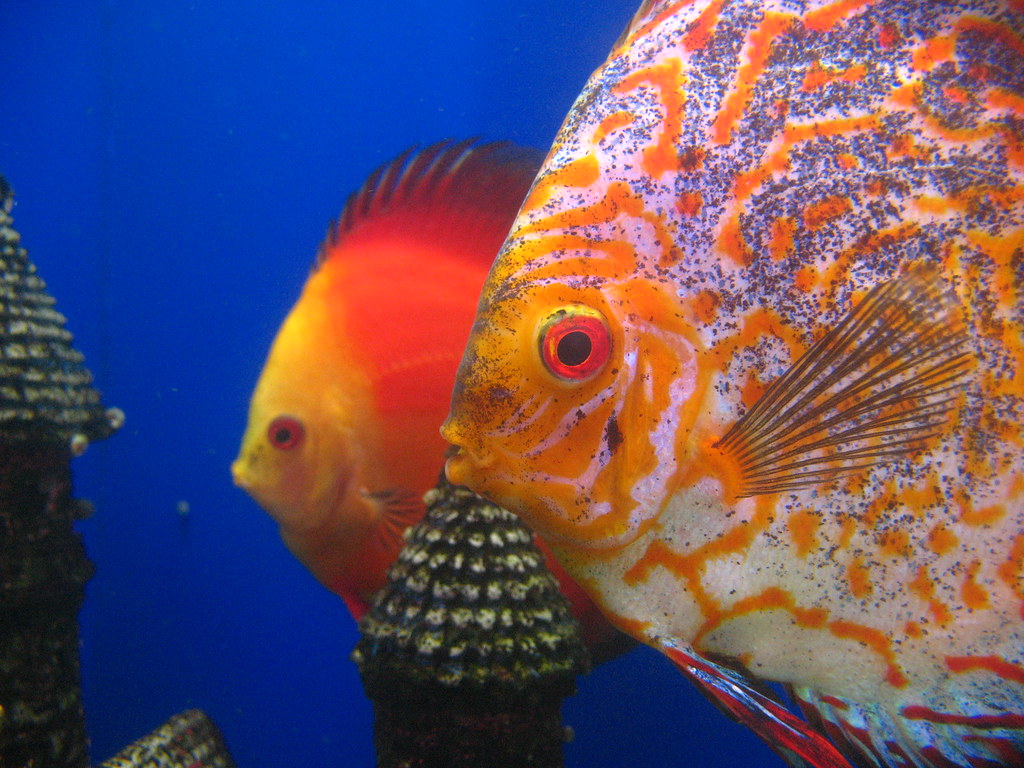
Symptoms of Discus Health Issues
Bacterial Infections
Bacterial infections are a common health issue in discus fish, and can be caused by a variety of factors, including poor water quality, injury, or a weakened immune system. Symptoms of bacterial infections include cloudy eyes, frayed fins, and a loss of appetite. If left untreated, bacterial infections can quickly become severe and lead to serious health problems for your discus fish.
Bacterial infections, such as columnaris, aeromonas, and pseudomonas, which can cause skin ulcers, fin rot, and digestive problems.
Fungal Infections
Fungal infections are another common health issue in discus fish, and can be caused by a variety of factors, including poor water quality, injury, or stress. Symptoms of fungal infections include white, cotton-like growths on the skin and fins. Fungal infections can quickly spread to other areas of the body, making prompt treatment essential.
Fungal infections, such as saprolegniasis and cotton wool disease, which can cause white patches or cotton-like growths on the fish’s skin, fins, and gills.
Parasites
Parasites are a common health issue in discus fish and can be caused by a variety of factors, including poor water quality, exposure to infected water, or a weakened immune system. Symptoms of parasites include itching and scratching, which can lead to further complications and stress for your discus fish.
Parasitic infections, such as ich (white spot disease), velvet disease, and anchor worm, which can cause skin and gill irritation, as well as decreased appetite and reduced energy levels.
Stress
Stress is a common health issue in discus fish and can be caused by a variety of factors, including changes in water quality, temperature, or diet. Stress weakens the immune system and makes discus fish more susceptible to illness. Symptoms of stress include a loss of appetite, lethargy, and abnormal swimming behavior.
Stress-related illnesses, such as lateral line disease, which can occur when fish are exposed to high levels of stress or poor water quality.
Treatment and Prevention of Discus Health Issues
Antibiotics
Antibiotics are a common treatment for bacterial infections in discus fish and can be prescribed by a veterinarian. Antibiotics work by killing the bacteria causing the infection, but it is important to follow the instructions carefully and complete the entire course of treatment to ensure the infection is completely cleared.
Fungicides
Fungicides are a common treatment for fungal infections in discus fish and can be purchased at a pet store or prescribed by a veterinarian. Fungicides work by killing the fungus causing the infection, but it is important to follow the instructions carefully and complete the entire course of treatment to ensure the infection is completely cleared.
Parasite Treatment
Parasite treatment may include medication and/or water changes, and can be purchased at a pet store or prescribed by a veterinarian. Treatment will depend on the specific parasite affecting your discus fish, so it is important to seek advice from a veterinarian or experienced aquarium keeper.
Minimizing Stress
Minimizing stress is key to preventing health issues in discus fish and can be achieved by providing a stable and stress-free environment. This includes maintaining good water quality, keeping the temperature stable, providing a nutritious diet, and avoiding overcrowding or aggressive tank mates. Additionally, try to minimize sudden changes to the environment and provide plenty of hiding places and spaces for your discus fish to swim and explore.
Preventing Health Issues in Discus Fish
To prevent health issues in your discus fish, it’s important to maintain a clean and healthy environment and to provide proper nutrition. Additionally, it’s a good idea to regularly observe your discus fish for any signs of illness, such as changes in behavior or appearance. If you suspect your discus fish may be sick, it’s important to seek veterinary care as soon as possible.
Tips for Successful Discus Fish Keeping
- Provide a large, spacious aquarium to give your discus fish plenty of room to swim and explore.
- Maintain clean, well-filtered water to keep your discus fish healthy and happy.
- Feed your discus fish a varied, protein-rich diet, including live or frozen foods and vegetables.
- Regularly clean your aquarium and equipment to maintain a healthy environment.
- Observe your discus fish regularly and seek veterinary care if you suspect they may be sick.
Conclusion
Discus fish are a beautiful and fascinating species that can make a stunning addition to any home aquarium. With proper care and attention to their specific needs, discus fish can thrive and live long, healthy lives. By following the tips outlined in this guide, you can enjoy the beauty of discus fish and keep them healthy for years to come.
FAQs
What is a discus fish?
Discus fish is a species of cichlid fish known for their unique shape and vibrant colors.
What is the ideal water temperature for discus fish?
The ideal water temperature for discus fish is between 82-86°F.
What is the ideal pH level for discus fish?
The ideal pH level for discus fish is between 6.0-7.0.
What is the ideal water hardness for discus fish?
The ideal water hardness for discus fish is between 4-8 dGH.
What kind of water filtration system do discus fish need?
Discus fish need a strong water filtration system, such as a canister filter or a power filter.
What kind of substrate is best for discus fish?
A fine sand or smooth gravel substrate is best for discus fish.
How often should I clean the tank for discus fish?
The tank for discus fish should be cleaned regularly, with partial water changes at least once a week.
What kind of food should I feed my discus fish?
Discus fish should be fed a varied diet of high-quality pellets, frozen or live foods.
How often should I feed my discus fish?
Discus fish should be fed 2-3 times a day in small portions.
Can discus fish live in a community tank?
Discus fish can live in a community tank with compatible species, but they are also fine on their own.
How big do discus fish get?
Discus fish can grow up to 8 inches in diameter.
What is the lifespan of a discus fish?
The lifespan of a discus fish can be up to 10 years or more with proper care.
How often should I change the water for my discus fish?
The water for a discus fish tank should be changed regularly, with partial water changes at least once a week.
Can discus fish live with other cichlid species?
Discus fish can live with other cichlid species, but it is important to choose compatible tank mates.
What kind of lighting do discus fish need?
Discus fish need bright lighting, but not direct sunlight.
How much space does a discus fish need?
A single discus fish needs a minimum of 30 gallons of water, while a pair needs at least 55 gallons.
Do discus fish need a heater?
Yes, discus fish need a heater to maintain the ideal water temperature.
How do I acclimate my discus fish to a new tank?
To acclimate your discus fish to a new tank, slowly add small amounts of the new water to their current water over a period of an hour.
Can discus fish live with plants?
Yes, discus fish can live with plants in the tank, but they may uproot or damage delicate species.
How do I breed discus fish?
Breeding discus fish requires a large, established tank with a suitable breeding cone and consistent water conditions.
External References for Freshwater Aquariums
- American Association of Aquatic Animal Veterinarians (AAAV) – https://www.aaav.org/ This is a professional organization for veterinarians specializing in the care of aquatic animals, including freshwater fish. They provide resources and information on fish health, disease, and husbandry.
- American Livebearer Association (ALA) – http://www.livebearers.org/ The ALA is a national organization dedicated to promoting the keeping and breeding of livebearers, which are a group of freshwater fish that give birth to live young. They provide information and resources on livebearer species, care, and breeding.
- Aquatic Gardeners Association (AGA) – https://www.aquatic-gardeners.org/ The AGA is an international organization dedicated to promoting the art and science of aquarium plants and freshwater fish keeping. They provide information, resources, and events for aquarium hobbyists and professionals.
- International Association of Fish Veterinarians (IAFV) – http://www.iafv.org/ The IAFV is a professional organization for veterinarians who specialize in the care of fish and aquatic animals. They provide resources, information, and continuing education opportunities for members.
- North American Native Fishes Association (NANFA) – https://www.nanfa.org/ The NANFA is a non-profit organization dedicated to promoting awareness and conservation of North American native freshwater fish species. They provide information, resources, and events for hobbyists and professionals interested in these species.
- The Aquarium Club – https://theaquariumclub.com/ The Aquarium Club is a community for freshwater aquarium hobbyists. They provide information, resources, and a forum for discussion on freshwater fish keeping and aquarium maintenance.
- The Ornamental Aquatic Trade Association (OATA) – https://www.ornamentalfish.org/ The OATA is a trade association for the ornamental aquatic industry in the UK. They provide resources, information, and support for businesses and hobbyists in the freshwater aquarium industry.
- The Fish Health Section of the World Aquaculture Society (WAS) – https://was.org/fish-health/ The Fish Health Section of the WAS is dedicated to promoting best practices in fish health management for aquaculture and freshwater fish keeping. They provide resources, information, and events for professionals and hobbyists in the industry.
- Tropical Fish Keeping – https://www.tropicalfishkeeping.com/ Tropical Fish Keeping is a website and community for freshwater aquarium hobbyists. They provide information, resources, and a forum for discussion on all aspects of freshwater fish keeping.
- The Aquatic Experience – https://www.aquaticexperience.org/ The Aquatic Experience is an event for freshwater aquarium hobbyists and professionals. They provide a platform for education, networking, and showcasing the latest products and trends in the industry.
Please also check out other articles on this website like
Master Breeding Techniques for Angelfish – A Guide for Hobbyists
Mastering Dwarf Puffer Fish Care: A Friendly Guide
Male or Female Betta? How to Tell – Your Ultimate Guide
Complete Guide to Plecostomus Tank Size: Tips and Advice
Simple Guide to Easy-to-Care-for Aquarium Plants
Discover the Diverse Corydoras Catfish Varieties- A Guide
Get to Know Various Types of Algae Eaters
Master Guide: Best Water Parameters for Goldfish Care 2023-24
Mastering Black Ghost Knife Fish Care: A Comprehensive Guide
Optimal pH Levels for Tropical Fish: Essential Aquarium Guide
Discovering Freshwater Snail Species: An In-depth Guide
Expert Tips for Breeding Guppies: Keys to Successful Fishkeeping
Discover Peaceful Community Fish: Your Guide to Calm Aquatics
Ultimate Guide to Live Food for Betta Fish — Healthy Choices
Complete Guide to Your Perfect Cichlid Tank Setup
Your Guide to the Best Substrate for Planted Aquariums
Essential Guide to Discus Fish Care: Help Your Pets Thrive!
Grow Your Own Eden: Beginner-Friendly Aquascaping Plants Guide
Perfect Neon Tetra Tank Mates: Guide to Aquarium Harmony
Product Review of Eheim Classic vs Professional
-
What Snails Can Live With Bettas?: A Complete Guide
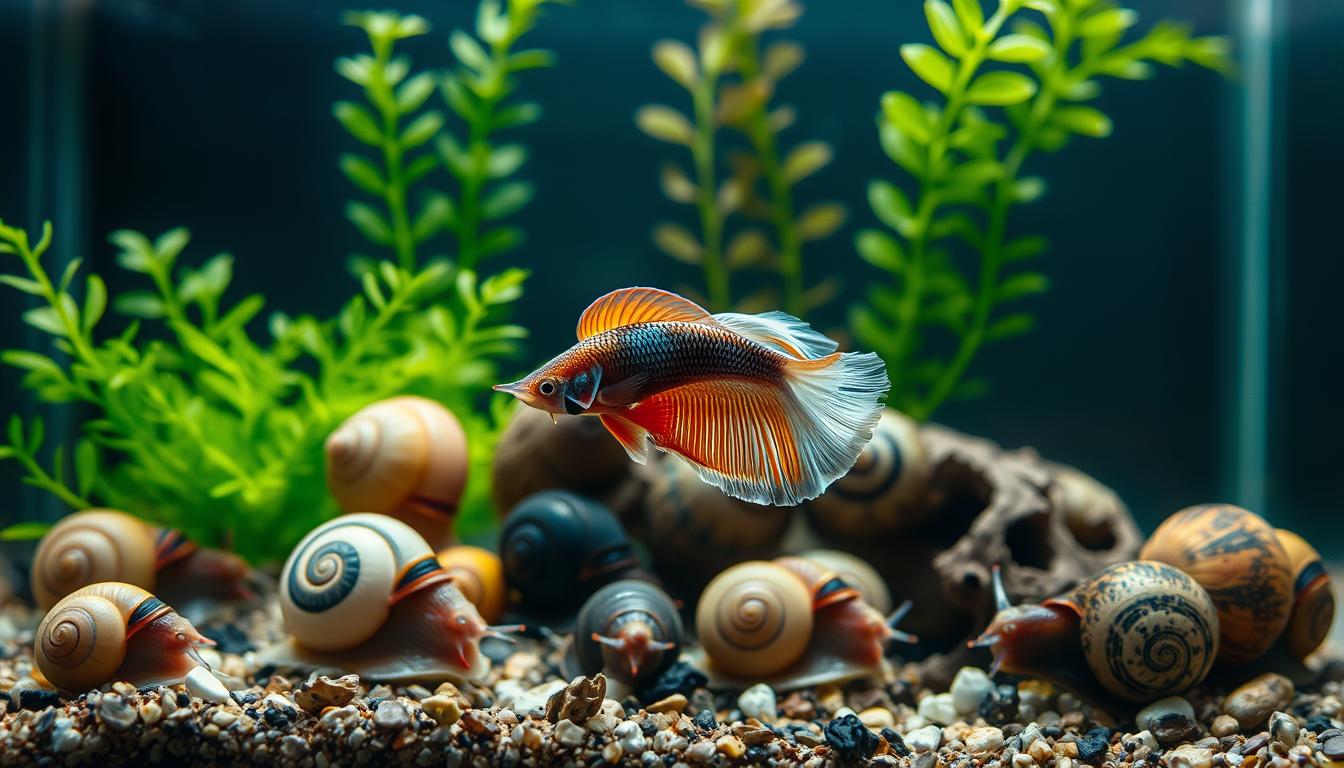
Discover what snails can live with bettas in this comprehensive guide. Learn about compatible snail species, tank requirements, and tips for maintaining harmony in your aquarium
-
Best Soil for Caridina Shrimp: Complete Guide 2025

Discover the best soil for caridina shrimp in my comprehensive guide. Learn about pH levels, buffering capacity, and top substrate choices to create the perfect environment for your shrimp.

